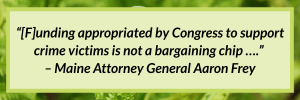Federal Litigation Efforts are Protecting Victim Services Funding to Maine
Federal Litigation Efforts are Protecting Victim Services Funding to Maine
MCEDV is grateful for the efforts of Maine’s Attorney General and 20 of our partner state domestic violence and sexual assault coalitions across the country who have initiated legal challenges to persistent, unlawful actions taken by federal agencies this year that threaten essential federal victim services funding. These efforts have consistently resulted in court orders that allow Maine service providers to continue to access the essential federal funds that support safety and stability for crime victims in our state, including:
- A temporary restraining order halting the Office of Management and Budget’s attempt to freeze all federal grant funding indefinitely;
- A preliminary injunction preventing the enforcement a new interpretation of the Personal Responsibility and Work Opportunity Reconciliation Act, which would have required victim service providers to violate both the Violence Against Women Act and the Family Violence Prevention and Services Act by requiring verification of immigration status before helping people in crisis;
- A preliminary injunction prohibiting the US Department of Housing and Urban Development and the US Department of Health and Human Services from imposing unlawful conditions on federal funding that we receive through the Continuum of Care grants and funding through the Office of Family Violence Prevention and Services that similarly would have required violation of VAWA and FVPSA; and
- A preliminary injunction prohibiting the US Department of Justice from requiring applicants for federal funding authorized under VAWA to commit to grant conditions that would restrict services in ways that, again, violate anti-discrimination provisions contained in that federal statute.
Additionally, two challenges brought by Maine’s Attorney General, in partnership with 20 other states, provide at least temporary protection for essential Victims of Crime Act (VOCA) funding. First through a challenge of new certification requirements issued by the US Department of Justice on VOCA grants to the states, and, most recently, through a challenge to prevent the enforcement of substantially similar unlawful conditions in the DOJ’s Funding Guide, which would condition receipt of VOCA funds on cooperation with immigration enforcement directives.
While these litigation successes are temporary, they have been important to providing a level of stability to victim service providers. Our doors continue to be open to help and support any person experiencing domestic abuse and violence in Maine. 

